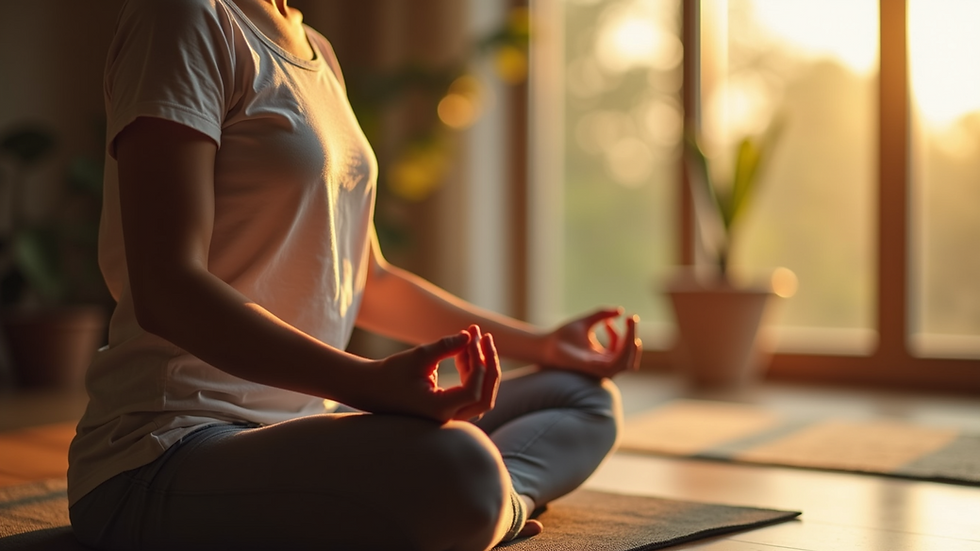Top 10 Anxiety Coping Tools for Daily Life
- Sydnie Kelman
- Sep 8
- 3 min read
Anxiety can feel overwhelming. It can creep into your daily routine and make even the simplest tasks seem daunting. Whether you are facing a big presentation at work or just dealing with everyday stressors, having effective coping tools can make a significant difference. In this post, we will explore ten practical anxiety coping tools that you can incorporate into your daily life.
These tools are designed to help you manage anxiety in a way that feels natural and achievable. Let’s dive in and discover how you can take control of your anxiety.
1. Deep Breathing Exercises
One of the simplest yet most effective tools for managing anxiety is deep breathing. When you feel anxious, your breathing often becomes shallow. Deep breathing helps to calm your mind and body.
To practice deep breathing:
Find a quiet space.
Sit or lie down comfortably.
Inhale deeply through your nose for a count of four.
Hold your breath for a count of four.
Exhale slowly through your mouth for a count of six.
Repeat this process several times. You will likely notice a reduction in your anxiety levels.
2. Mindfulness Meditation
Mindfulness meditation is another powerful tool for coping with anxiety. It encourages you to focus on the present moment, which can help reduce racing thoughts.
To practice mindfulness:
Sit in a comfortable position.
Close your eyes and take a few deep breaths.
Focus on your breath, noticing how it feels as it enters and leaves your body.
If your mind wanders, gently bring your focus back to your breath.
Even a few minutes of mindfulness can help you feel more grounded.
3. Physical Activity
Exercise is a fantastic way to combat anxiety. Physical activity releases endorphins, which are natural mood lifters.
You don’t need to engage in intense workouts. Simple activities like walking, dancing, or yoga can be beneficial. Aim for at least 30 minutes of physical activity most days of the week.
Find an activity you enjoy, and make it a regular part of your routine.
4. Journaling
Writing down your thoughts and feelings can be a great way to process anxiety. Journaling allows you to express what you are going through without judgment.
Try to set aside a few minutes each day to write. You can jot down:
Your feelings
What triggered your anxiety
Positive affirmations
This practice can help you gain clarity and perspective on your emotions.
5. Grounding Techniques
Grounding techniques can help you stay connected to the present moment when anxiety feels overwhelming. One popular method is the 5-4-3-2-1 technique.
To use this technique:
Identify 5 things you can see.
Identify 4 things you can touch.
Identify 3 things you can hear.
Identify 2 things you can smell.
Identify 1 thing you can taste.
This exercise can help distract your mind from anxious thoughts and bring you back to the present.
6. Establish a Routine
Having a daily routine can provide structure and predictability, which can be comforting when you feel anxious.
Try to create a schedule that includes:
Regular wake-up and sleep times
Meal times
Time for work and relaxation
A routine can help you feel more in control and reduce feelings of anxiety.
7. Limit Caffeine and Sugar
Caffeine and sugar can increase feelings of anxiety. If you find that you are feeling anxious, consider reducing your intake of these substances.
Instead, opt for herbal teas or water. Focus on whole foods like fruits, vegetables, and whole grains. A balanced diet can have a positive impact on your mood.
8. Connect with Others
Social support is crucial for managing anxiety. Talking to friends or family members can help you feel less isolated.
Consider reaching out to someone you trust when you are feeling anxious. You can also join support groups or online communities where you can share your experiences and learn from others.
9. Practice Gratitude
Focusing on what you are grateful for can shift your mindset and reduce anxiety.
Try to write down three things you are grateful for each day. They can be as simple as a warm cup of coffee or a kind word from a friend. This practice can help you cultivate a more positive outlook.
10. Seek Professional Help
If your anxiety feels unmanageable, it may be time to seek professional help. Therapists and counselors can provide support and strategies tailored to your needs.
Don’t hesitate to reach out for help. You deserve to feel better.

Incorporating these tools into your daily life can help you manage anxiety more effectively. Remember, it is okay to seek help and take things one step at a time.
By using these coping strategies, you can create a more peaceful and balanced life. Embrace the journey, and take care of yourself.
%20copy%203.png)


Comments